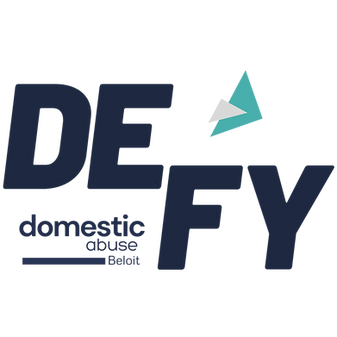Defy Domestic Abuse Beloit

Domestic Abuse Can Happen To Anyone
-
Happens to men of all genders
-
Happens in same-sex relationships
-
Happens in the Transgender community
-
Happens in the Bisexual community
-
Happens to kids, teens, adults, and elders by those of all ages
-
Happens to all races and ethnicities
-
Happens in every income level
-
Happens in every religious practice
-
Happens to children by adults of all genders and by other children










Domestic Abuse Is Not Just Physical.
Domestic abuse is holding power over someone in order to control them. That power can be any, all, or any combination of:
physical, verbal, sexual, financial, emotional, social.


1 in 3 women and 1 in 4 men have experienced physical violence by an intimate partner.
*And yes: shoving, pushing, and other “oh, that’s not a big deal” behavior is absolutely a big deal:
Because all of it is physical violence
Members of the LGBTQ community experience domestic abuse within their relationships at the same rate as the those outside the community.


That works out to 10 million abused people in the USA in just one year.
*Statistics from 2010 CDC Report
- Them being overly controlling and possessive
- Them blaming you for their aggression
- Them isolating you from your friends and family
- Them losing their temper easily
- Them being extremely jealous
- Them downplaying their violence

Why
It ‘s So Hard To Leave
- Many don’t recognize they are in an abusive relationship – so they don’t leave.
- Many others fully see they are in an abusive relationship – but they feel they can’t leave.
- Why? Because, for very valid reasons, they feel:
- They can’t afford to
- They will be homeless
- They may never see their kids again
- Why? Because, for very valid reasons, they feel:
- They’ll be chased and stalked
- They won’t be
- listened to
- believed
- supported by their friends / family / police / church or community.
“AFTER THEY HURT MY SON, I COULDN’T PUSH OFF THE DECISION ANYMORE. I HAD TO DECIDE:
DECIDE TO CRUMBLE IN DEFEAT OR GET UP AND DEFY.”


“IT BEGAN WHEN I WAS AROUND 6 OR 7, AND IT DIDN’T STOP UNTIL I MADE IT STOP YEARS LATER.
I MADE IT STOP BY MAKING A CHOICE.
I CHOOSE TO LEAVE.
I CHOOSE TO DEFY.”
TO BE HONEST, IT TOOK ME A LONG TIME TO SEE HOW ALL THESE SMALL ACTS FORMED A HUGE PATTERN.
IT TOOK SO LONG BECAUSE THE BIGGEST THING I HAD TO OVERCOME WASN’T LEAVING THEM – IT WAS OVERCOMING THE VOICE IN MY HEAD THAT SAID ‘YOU DESERVE THIS AND YOU SURE DON’T DESERVE ANYTHING BETTER.’
ONE OF THE SCARIEST, HARDEST THINGS I’VE EVER DONE IS STEPPING UP AND CHALLENING THAT VOICE.
BUT I DID IT. I STOOD UP, AND I DEFIED.”




Champion:
the inherent dignity of all people
Restore:
safety and dignity to all those affected by domestic abuse and violence
Interrupt & dismantle:
the personal, communal, and cultural catalysts of domestic abuse and violence.
